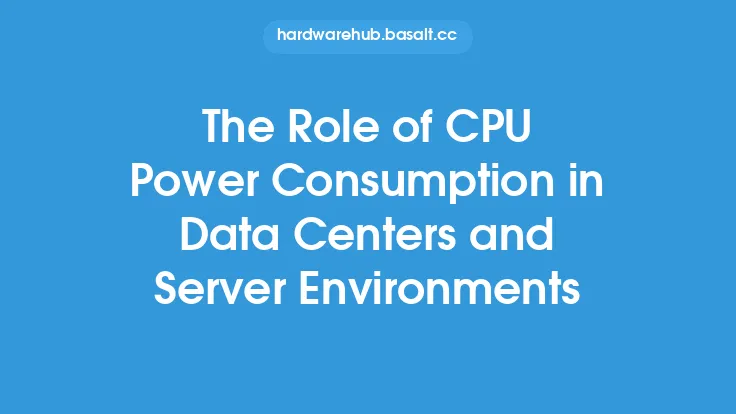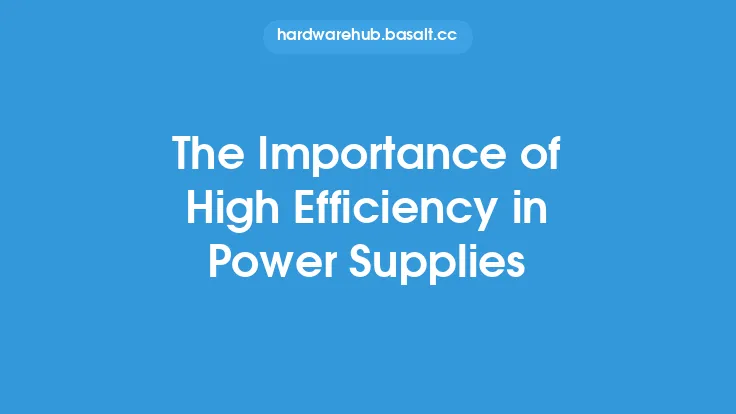As the world grapples with the challenges of climate change, energy consumption, and electronic waste, the importance of power supply efficiency has become increasingly evident. Power supplies, a crucial component of electronic devices, play a significant role in determining the overall energy efficiency of a system. In this article, we will delve into the world of power supply efficiency, exploring its significance, technical aspects, and the benefits it offers in reducing energy consumption.
Introduction to Power Supply Efficiency
Power supply efficiency refers to the ability of a power supply unit (PSU) to convert input power from the mains to usable output power for the device, while minimizing energy losses. A power supply's efficiency is typically measured by its power conversion efficiency, which is the ratio of output power to input power. This efficiency is usually expressed as a percentage, with higher values indicating better efficiency. For instance, an 80% efficient power supply will convert 80% of the input power into usable output power, while the remaining 20% is lost as heat.
Technical Aspects of Power Supply Efficiency
From a technical standpoint, power supply efficiency is influenced by several factors, including the design and construction of the PSU, the quality of its components, and the operating conditions. One key factor is the type of power conversion topology used, such as linear or switching. Switching power supplies, which use high-frequency switching to regulate output voltage, are generally more efficient than linear power supplies, which rely on voltage regulation through resistive elements. Additionally, the use of high-quality components, such as capacitors and inductors, can significantly impact a power supply's efficiency.
Benefits of High Efficiency Power Supplies
High efficiency power supplies offer numerous benefits, including reduced energy consumption, lower operating costs, and decreased heat generation. By minimizing energy losses, efficient power supplies can help reduce the overall energy consumption of a device or system, leading to cost savings and a lower carbon footprint. Furthermore, high efficiency power supplies tend to produce less heat, which can improve the reliability and lifespan of the device, as well as reduce the need for cooling systems.
Factors Affecting Power Supply Efficiency
Several factors can affect a power supply's efficiency, including the load level, input voltage, and operating temperature. Power supplies typically operate at their highest efficiency when loaded between 20% and 80% of their maximum capacity. Operating a power supply at very low or very high loads can lead to decreased efficiency. Additionally, input voltage fluctuations and high operating temperatures can also negatively impact a power supply's efficiency.
Measuring Power Supply Efficiency
Measuring power supply efficiency involves calculating the ratio of output power to input power. This can be done using specialized test equipment, such as power meters and oscilloscopes. The most common method of measuring power supply efficiency is the 80 PLUS certification program, which tests power supplies under various load conditions and input voltages. The 80 PLUS program assigns efficiency ratings, such as Bronze, Silver, Gold, Platinum, and Titanium, based on the power supply's efficiency at 20%, 50%, and 100% loads.
Real-World Applications of Power Supply Efficiency
The importance of power supply efficiency extends beyond the realm of computer hardware, with applications in a wide range of industries, including telecommunications, medical devices, and renewable energy systems. In the telecommunications sector, for example, high efficiency power supplies are used to reduce energy consumption and heat generation in data centers and base stations. Similarly, in the medical device industry, efficient power supplies are used to power life-saving equipment, such as ventilators and dialysis machines.
Future Developments in Power Supply Efficiency
As technology continues to evolve, we can expect to see significant advancements in power supply efficiency. The development of new power conversion topologies, such as gallium nitride (GaN) and silicon carbide (SiC) based power supplies, promises to further improve efficiency and reduce energy losses. Additionally, the increasing adoption of renewable energy sources, such as solar and wind power, will drive the demand for high efficiency power supplies that can optimize energy harvesting and storage.
Conclusion
In conclusion, power supply efficiency plays a vital role in reducing energy consumption and promoting sustainability. By understanding the technical aspects of power supply efficiency and the benefits it offers, we can make informed decisions when selecting power supplies for our devices and systems. As technology continues to advance, we can expect to see significant improvements in power supply efficiency, leading to a more energy-efficient and environmentally friendly future.





